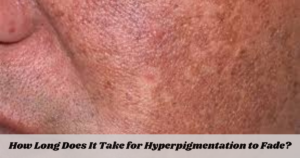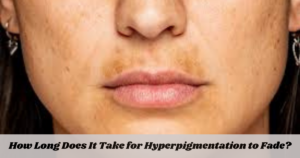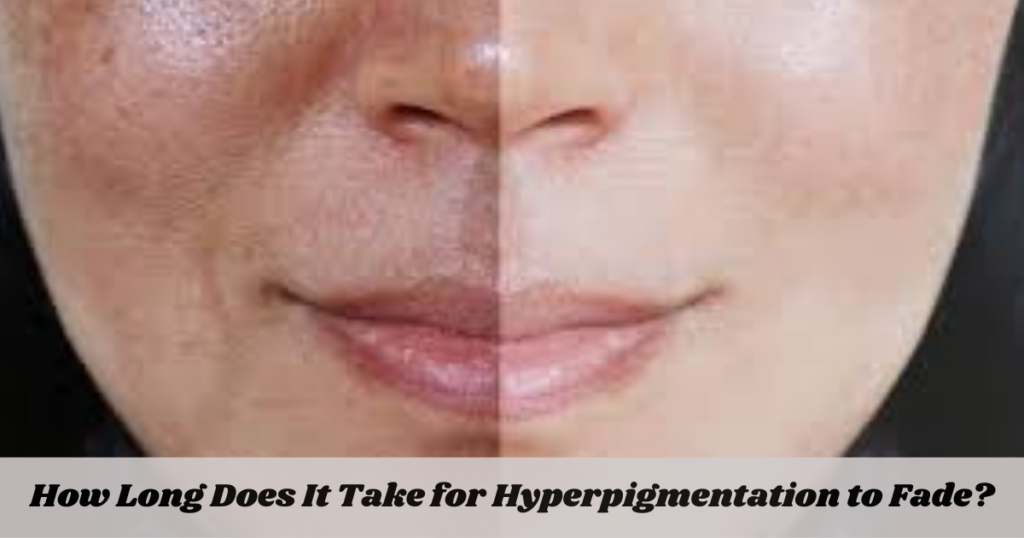Dark spots, uneven skin tone – hyperpigmentation can be a frustrating concern for many. If you’re one of them, you’ve likely wondered, “How Long Does It Take for Hyperpigmentation to Fade? ” Understanding the timeline for hyperpigmentation fading is crucial for setting realistic expectations and choosing the right treatment approach. This blog post will delve into the world of hyperpigmentation, exploring its causes, the factors influencing its fading process, and effective treatment options.

What is Hyperpigmentation?
Hyperpigmentation is a common skin condition characterized by the darkening of certain areas due to an overproduction of melanin, the pigment responsible for skin color. Melanin production can be triggered by various factors, including:
- Sun exposure: This is the most common cause of hyperpigmentation. Ultraviolet (UV) rays stimulate melanin production, leading to sunspots, freckles, and uneven tanning.
- Hormonal changes: Pregnancy, menopause, and birth control pills can cause hormonal fluctuations that trigger hyperpigmentation, particularly melasma, which often appears as symmetrical patches on the face.
- Inflammation: Skin injuries, acne breakouts, and insect bites can lead to post-inflammatory hyperpigmentation (PIH), where the skin overproduces melanin to heal the damaged area.
There are different types of hyperpigmentation, each with varying appearances and causes. Understanding the type you have will help determine the best course of treatment.
Is Hyperpigmentation stubborn?
Yes, hyperpigmentation can be stubborn. Here’s why:
- Melanin Production: Hyperpigmentation occurs due to excess melanin production in the skin. Melanin is a natural pigment that protects the skin from sun damage. Once excess melanin is produced, it can take time for the body to break it down and eliminate it.
- Depth of Discoloration: Deeper hyperpigmentation penetrates lower layers of the skin, making it more resistant to fading compared to surface-level discoloration.
- Underlying Cause: The cause of hyperpigmentation can also influence its stubbornness. For example, hormonal hyperpigmentation, like melasma, can be more challenging to treat than sunspots.
- Individual Skin Response: Everyone’s skin reacts differently to treatments. Some people may experience faster fading with consistent treatment, while others may require a longer timeframe to see significant improvement.
Factors Influencing the Fading Process
The time it takes for hyperpigmentation to fade depends on several factors:
- Skin Type: People with darker skin tones naturally have more melanin and may experience hyperpigmentation more intensely. However, hyperpigmentation can affect all skin types.
- Severity of Hyperpigmentation: Deeper pigmentation generally takes longer to fade compared to mild hyperpigmentation.
- Treatment Methods Used: Certain treatments, like laser therapy, can offer faster results than topical creams. However, the effectiveness can vary depending on the specific treatment and the individual.
- Individual Skin Response: Everyone’s skin reacts differently to treatments. Some people may see significant fading within a few weeks, while others may require months to achieve visible results.
How Long Does It Take for Hyperpigmentation to Fade? Timelines
It’s important to remember that fading hyperpigmentation takes time and patience. Here’s a general timeline to give you an idea:
- Mild Hyperpigmentation: With consistent treatment, mild hyperpigmentation may begin to fade within 3-6 months.
- Moderate Hyperpigmentation: Moderate hyperpigmentation typically requires 6-12 months of dedicated treatment for noticeable improvement.
- Severe Hyperpigmentation: Deep hyperpigmentation, such as some types of melasma, can take a year or more to fade significantly, and may require a combination of treatment approaches.
Remember, this is just a general guideline. The actual fading time can vary considerably.

Treatment Options for Hyperpigmentation
Several treatment options can effectively address hyperpigmentation:
- Topical Creams: These are often the first line of defense, with ingredients like hydroquinone, retinoids, and kojic acid that lighten hyperpigmented areas.
- Chemical Peels: Chemical peels use controlled exfoliation to remove the top layers of skin, encouraging new cell growth and reducing hyperpigmentation.
- Laser Therapy: Laser treatments target specific areas of hyperpigmentation with focused light energy to break down melanin and promote fading.
- Microdermabrasion: This minimally invasive procedure removes the top layer of skin with fine crystals, helping to even out skin tone.
Home Remedies and Preventive Measures
While not a substitute for professional treatment, some natural remedies and lifestyle changes may support hyperpigmentation fading:
- Vitamin C Serums: Vitamin C is a natural antioxidant that can help brighten the skin and reduce hyperpigmentation.
- Licorice Root Extract: This extract has skin-lightening properties and can be found in some topical creams.
- Sun Protection: Daily sunscreen use with SPF 30 or higher is crucial to prevent further hyperpigmentation and protect your skin from harmful UV rays.
- Minimize Sun Exposure: Limit direct sun exposure and wear protective clothing like hats and sunglasses when outdoors.
Consulting a Dermatologist
For personalized advice and effective treatment plans, consulting a dermatologist is highly recommended. They can diagnose the specific type of hyperpigmentation you have, assess its severity, and recommend the most suitable treatment options.
Be Patient and Consistent
Fading hyperpigmentation takes time and dedication. Consistent use of prescribed creams, following recommended treatment schedules, and prioritizing sun protection are crucial for long-term results.
Maintain a Healthy Lifestyle
Certain lifestyle habits can support hyperpigmentation fading. This includes getting enough sleep, managing stress levels, and eating a balanced diet rich in antioxidants.
Explore Advanced Treatments
For stubborn hyperpigmentation, a dermatologist may recommend stronger topical creams, laser therapy, or chemical peels. However, these options often come with higher costs and potential side effects, so discussing them thoroughly with your dermatologist is essential.
Conclusion
Hyperpigmentation can be a stubborn concern, but with the right approach, you can achieve a more even skin tone. Remember, patience and consistency are key. This blog post has hopefully provided valuable information on How Long Does It Take for Hyperpigmentation to Fade, different treatment options, and the importance of consulting a dermatologist for personalized advice.

